Nikola Tesla Croatian citizen advised
the Mayor of Croatia's capital
Zagreb in 1892 about electrification
Vesna Blažina and Darko Žubrinić, 2016.Članak o Teslinom predavanju u Gradskoj vijećnici u Zagrebu, u vrijeme gradonačelnika Milana Amruša, objavljen u "Narodnim novinama" 25. svibnja 1892. Nikola Tesla o električnoj razsvjeti u Zagrebu Čuveni elektrotehnički strukovnjak, naš zemljak Nikola Tesla, koji je na poziv gradskog načelnika dra. Amruša došao u Zagreb, da savjetom svojim podupre gradsko poglavarstvo u predmetu uvođenja električne razsvjete razlagao je jučer do podne u prisustvu gradskog načelnika i donačelnika, gradskih viećnikah Mallina i Hudovskoga i gradskog mjernika Lenucia svoje nazore o načelnim pitanjima poduzeća. Gosp. Tesla, čovjek od po prilici 35 godinah, visok, tanak kao jela rodnog kraja, crnih kosah i očijuh, koji na svom širokom čelu nosi pečat genija, držao je dulji expose, iz kojeg crpimo sljedeće važnije podatke. Bez svake dvojbe i bez svakih od ma kuda nastalih prigovorah mora gradska obćina urediti električnu centralu u vlastitoj režiji, i to ponajviše s toga razloga, jer je dan danas pitanje električne razsvjete već izašlo iz experimentalnog štadija, te već sa pozitivnim podatcima i stvarima radi. Stara družtva, koja su ustrajala ovakova štacije u dobi, kad je ciela stvar još bila u razvitku, danas imade dohodak od 6, 7, do 8%, a kako nebi onda poduzeće napredovalo, koje već sa stalnim izkušanim faktorima računati može, gdje po današnjem stanju stvari eventualne preinake se samo sitnosti ticati mogu, ali nikakava više principa. Za grad Zagreb, kao glavni grad ove zemlje, nastaje ne samo mogućnost, nego baš dužnost da uvede tu novu razsvjetu, jer to nije samo koristi za grad sam, nego za cielu zemlju, i rek bi, sramota bi bila za Zagreb, da nije on kolovodja u tom pitanju. Biti će, dakako, potežkoća, ali je svaki početak težak, te će se moći kratkim vremenom i savjestnim radom i te potežkoće prevaldati. Prva će biti potežkoća izbor sistema, ili istosmjerna ili naizmjenična struja. (Gleichstrom ili Wechselstrom). Nu na temelju svojih vlastitih izkustava savjetuje gosp. Tesla na svaki način upotrebljavanje naizmjenične struje, i to ponajviše s tih razlogah, što su dotični strojevi jeftiniji i jednostavniji i što je manipulacija š njima sa puno manjim troškom skopčana, nego kod strojeva za istosmjernu struju, dalje i s tog razloga, što se svaki novi proiznalazak kod izmjenične struje lakše uvesti može, nego kod istosmjerne struje. Dalje mora se i to u obzir uzeti, da se izmjenična struja puno dalje voditi može, nego istosmjerna, n. pr. u Lauffenu se je vodila 150 kilometrah, i kod uređenja električne razsvjete u New-Yorku vodit će se struja od Niagara-pada, dakle preko 400 klm. To se kod istosmjerne struje nemože. Druga će potežkoća nastati kod nabavke strojevah. Prem su dan danas svi strojevi, izašli iz koje god tvornice, jako izvrsni i sigurni, to ipak treba paziti, da ne bi u cienama nastala koja prevara. Zato treba da gradska obćina sebi priskrbi mladu jednu tehničku silu, koju valja poslati u sve tvornice električnih strojevah, da si na licu mjesta izuči i izkusi mašine i njihovo djelovanje, tako, da i na temelju stečenih očevidom izkustva, siguran i temeljito opravdan sud stvoriti može, odkud bi se strojevi nabavili. Gospodin Tesla je u tom pogledu toplo preporučio dva mlada zemljaka, izučena genijalna tehničara, koji bi za taj posao sasma sposobni bili. Na pitanje grad. načelnika, nebi li se možda voda rieke Mrežnice, koja medju Karlovcem i Generalskim stolom u jako izsječenom koritu teče, te se branom lako zaustavljati dade, dostatna sila bila, da proizvadja struju potrebnu za 3000 žarnicah, kojih bi za Zagreb sad trebalo, odgovori g. Tesla, da po njegovom mnienju to biti nemože. Za 3000 žarnicah naime treba sila od 400 konjskih silah, toliko pako Mrežnica, koju je on pohadjao prigodom svog boravka u Karlovcu, nebi nikako mogla dati, nego najviše 200 konjskih silah. Ako bi pako novačana sredstva dozvolila, da se jedna vodena sila upotrebi, onda bi bio za to naprikladniji pad Plitvičkih jezera. Ali proti tomu obstoje opet nekakve zaprieke, koje nebi dakako u Americi smetale, ali ovdje. Prvo, jer bi to veliku svotu novaca koštalo i drugo, što bi se moralo nekoliko padova uništiti. Izkustva naime dokazala su, da se pad, onako, kako u naravi postoji, nedade lahko izcrpiti, da bi se sva sila vode skupljati mogla, zato se u Americi već od više godinah u sličnim slučajevima n. pr. kod slapa Niagare tako radi, da se izkopa okno (Schacht), kroz koje se sva voda slapa spusti, koja voda onda na dnu okna turbinu tjera. Ali to košta puno novca i uništilo bi mnogo slapova Korane. Po računima g. Tesle dali bi slapovi Korane kod Kaludjerovca 3500 efektivnih konjskih silah. I pošto se polag izkustva u vodovima 25 do 28% izgubi, došlo bi ipak još toliko sile u Zagreb, da bi dovoljna bila ne samo za 3000 nego i za 25000 žarnicah. Iztaklo se je pitanje nije li uporaba električne sile opasna po ljudski život. Na to veli g. Tesla, da od svih energija dosada rabljenih, nijedna toliku sigurnost nepruža, koliko električna. Jer kod nje može samo jedna osoba zaglaviti, i to samo zbog neopreznosti. I tome se dade izbijeći time, da se vodovi podzemno namjeste. Kad je g. Tesla došao u New-York, pripovijeda on, bilo je u zraku mreža od hiljadah i hiljadah žicah, i danomice su na tim žicama radili 4-5000 ljudih, ali na godinu nebi bilo više nesreća nego 2 ili 3 i to najviše stoga, što su dotični radnici pijani došli na posao i tako neopreznošću zaglavili. Što se tiče uvođenja električne razsvjete, to je gosp. Tesla toga mienja, da se sa 200.000 najviše 300.000 for. sasvim lahko izaći može. Gradu će biti zadaća da gradjanstvu pokaže koristi koli u razsvjetnom pravcu toli i glede poljepšanja grada samoga. Ali baš ta zadaća učiniti će nuždnim, da grad taj posao sa svim opreznostima izvede, da se promet neporemeti, što bi namah u pučanstvu nepouzdanje prama poduzeću prouzročilo. U tu svrhu preporuči on još jednom sistem naizmjenične struje, koja je u Americi tako napredovala, da je i Edison sam, taj prvak sistema istosmjerne struje, morao napustiti. I to je sigurno velika garancija za valjanost tog sistema, jer inače nebi praktični Amerikanci za nj prionuli. Namjeru, da se centrala kod vodovoda gradi, odobrava gosp. stručnjak sasma sbog blizine vode i lahkog dovažanja ugljena. Od tuda do grada bi se struja nadzemno vodila, u gradu pako podzemno. Dalje preporuči gosp. Tesla živo, da se struja i za industrijalne motorne svrhe podaje, jer to pruža siguran dohodak bez dalnjih troškovah i jer je električni motor u industriji nešto izvanredno praktična, ne samo što treba manje manipulacije i manjih troškovah, nego treba i manje mjesta i neprouzroči štropot i drugih neugodnostih, kao parni motor. Tom prilikom spominje gosp. gradonačelnik, da je za slučaj, da se munjara [hidrocentrala], gradi, ovdješnje tramway - družtvo voljno, tramway sa akumulatorima tjerati, te pita gosp. Teslu, bi li za to trebalo posebne uredbe, te je li to tjeranje akumulatorima već praktično rabljeno. Gosp. strukovnjak odvratio je na to, da je u Americi tjeranje tramwaya sa akumulatorima skoro sveobće i jako praktično. Posebnih troškovah neprouzroči navijanje akumulatorah nikakvih, jer se za razdraženje alteratora strojevah za izmjeničnu struju svakako mali strojevi za istosmjernu struju namjeste, koji onda ujedno akumulatore tramwaya družtva navijati mogu. Nastavljajuć onda razpravu o sagradjenju centrale razlaže g. Tesla sada posao koji gradsku upravu čeka, da se ta misao oživotvori. Prvo će biti da grad razpiše natječaj u kojem na temelju nacrta i prilične veličine instalacija pojedine tvrdke pozove, da šalju proračune i planove. Ujedno preporuči opet, da grad jednog tehničara šalje na lice mjesta, da prouči pojedine sisteme i strojeve. On sam pako je pripravan ponude, koje dospiju poglavarstvu, izpitati i svoje mnienje o njima dati, da može na taj način zapriečiti, da se grad neprevari. I u obće smatra on svojom dužnošću, upravi grada Zagreba, kao rođeni sin ove zemlje, u svakom pogledu, što se toga pitanja tiče, savjetom i činom biti na ruci, i moli da se grad u svakom slučaju gdje bi tehničke potežkoće nastale, na nj obraća, te će on bez ikakve odštete savjetovati, kako bude bolje znao. - Tim svrši on svoje zanimivo razlaganje. U ime grada izrazio mu je grado-načelnik dr. Amruš najsradačniju hvalu na njegovom trudu i obećanju, te mu želi za buduće najljepši uspjeh u svojem radu kojim ne samo sebe nego i domovinu svoju pred drugim svjetom diči. U dalnjem razgovoru spomenuo je gosp. Tesla, da sad radi na izvršenju jedne hipoteze, koji sasvim izvršivom smatra koja je od ne pojmljive važnosti, naime na prenosu električne struje bez žicah pomočju naravno munjene naše zemlje. Mi želimo našem zemljaku iz svega srdca najbolji uspjeh u tom poslu. G. Tesla kreće sutra put Varaždina, te će iz Varaždina u Budimpeštu. Ako mu vrieme dopusti, posjetit će i Biograd, kud su ga zvali, da i tamo svoje mnienje o uvođenju električne razsvjete kaže. Odtud će u Ameriku. Sretno pošao i sretno se vratio. |
An article published in “Narodne novine” May 25, 1892, about Nikola Tesla’s presentation at the Zagreb City Hall during the Mayorship of Dr. Milan Amruš. Nikola Tesla about electric lighting in Zagreb The famous electro-technical expert, our compatriot Nikola Tesla visited Zagreb at the invitation of Dr. Amruš in order to advise the City Council about installing electrical lighting in the city. Yesterday morning he made his views known in the presence of the Mayor and the Vice Mayor as well as of Mr. Mallina and Mr. Hudovski, the City Councillors, and Mr. Lenuci, the City Land Surveyor. Mr. Tesla, a man of around 35, tall, thin like a fir from his birthplace, with dark hair and dark eyes, a man who carries a mark of genius on his forehead, held a long speech from which we bring you the most important excerpts. Without any doubt and regardless of any objections coming from any source, the city must have its proper power plant mostly because the electrical lighting is no longer in an experimental stage and can give positive results. Old enterprises which applied the electrical energy when the whole enterprise was still being developed, today have an income of 6,7 to 8 %. Why would an enterprise not flourish when it can count on reliable and proven facts. Today, some changes are possible in electrical energy, but only in details, since the principles have been resolved. For the city of Zagreb, as the capital of this country, it is not only a possibility but the duty to install this new lighting, as a benefit for the city itself and the whole country, and we would say, it would be a shame if Zagreb was not a leader in this matter. There will be difficulties, of course, because every beginning is difficult but with conscientious work the problems will be overcome in no time. The first issue will be the choice of direct or alternating current (Gleichstrom or Wechselstrom). Based on his own experience, Mr. Tesla advises to use the alternating current mainly because such machines are cheaper and simpler and because their manipulation requires fewer expenses than the direct current ones. Furthermore, each new alternating current discovery is much easier to apply than the direct current one. Also, it has to be taken into account that the alternating current can be transmitted over much longer distances than the direct current. In Lauffen, for example, it was transmitted 150 km away, and in New York, the alternating current will be transmitted from Niagara Falls, more than 400 km away. This cannot be done with direct current. The second difficulty will be the choice of equipment. Although nowadays, all machines, from any factory, are very good and safe, one has to be careful to avoid paying excessive amounts for them. The City Council should therefore hire a young, technically minded person and send him to all the manufacturers of electrical machines to see them operate and learn about their functioning on the spot, so that based on his experience in the factory, he can form an informed and entirely justified opinion on the proper source of machines. In this regard, Mr. Tesla has warmly recommended two young compatriots, gifted technicians, who could adequately perform this job. The mayor asked Mr. Tesla if perhaps the water of the Mrežnica River, which flows in a deep-cut bed between Karlovac and Generalski stol, and could be easily stopped with a dam, could provide sufficient force to produce the power required for 3000 light bulbs needed for Zagreb at this moment. Mr. Tesla replied that according to him, this is not possible. Namely, for 3000 light bulbs a force of 400 horsepower is needed that the Mrežnica River, which he examined during his stay in Karlovac, cannot provide. At best, Mrežnica could provide 200 horsepower. If the finances permitted to use hydro power, then the Plitvice Lakes falls would be the most appropriate. However, there are obstacles to this solution, which would not be a problem in America, but here, it definitely would be. First of all, this option would be very costly and, second of all, several falls would have to be destroyed. Experience has shown, namely, that the falls, in their natural form, cannot easily be used to collect all the power of the water. In America, therefore, in similar cases, in Niagara Falls for example, for a number of years, a shaft has been made through which all water from the falls was channeled to make the turbine at the bottom of the shaft turn. Such an installation costs a lot of money and it would ruin many Korana River Falls. According to the calculations of Mr. Tesla, the Korana River Falls near Kaludjerovac would actually provide 3500 horsepower. And since experience has shown that 25 to 28 % of power is lost during transmission, sufficient power would reach Zagreb to be enough not only for 3000 but for 25000 light bulbs. The question was raised whether the use of electrical power is dangerous for human life. Mr. Tesla replied that of all the types of energy used so far, the electrical power is the safest. Only a single person dealing with electrical power could lose his life due to his carelessness. To avoid that danger, the power lines can be placed under ground. Mr. Tesla recounts that when he came to New York, there was overhead networks of thousands and thousands of wires in the air, and every day there were 4,000 to 5,000 people working on them, but there were no more than 2 or 3 accidents per year, mostly because workers had come to work drunk and loss of life was due to their carelessness. According to Mr. Tesla, electrical lighting could easily be installed at the cost of no more than 200,000 to 300,000 forints. It is the task of the City to demonstrate to the citizens the usefulness of electrical lighting as well as its contribution to the beautification of the city. In order to avoid the loss of trust of the citizens in this project, the city will have to execute the works with all the precautions making sure that the flow of traffic is not affected. For this purpose, Mr. Tesla recommended again the system of alternating current, which had made such progress in America that Edison himself, the main proponent of direct current, had to abandon it. This is for sure a great warranty for this system, because otherwise, the practical Americans would not embrace it. Our expert approves of the power plant being built close to the waterworks because of the vicinity of the water and the ease of bringing coal. The electrical power would be transmitted on overhead lines from there to the city, but underground in the city. Furthermore, Mr. Tesla recommends the usage of electrical power for industrial motors because it offers guaranteed income without additional expenses and because the electrical motor is extremely practical, not only because it needs less manipulation and requires fewer expenses, but because it also requires less space, makes less noise and it involves fewer inconveniences than the steam engine. At this point the mayor mentions that if the hydroelectric power plant was built, the local tramway society would be willing to run the electrical tramway. The mayor enquires whether particular regulations are necessary and whether this type of tramway has already been implemented. Our expert replied that the electrical tramway is very practical and is used everywhere in America. Running the electrical tramway does not require any additional expenses because small direct current machines can be used to boost the alternator of the alternating current machines that can then run the accumulators of the tramway society. Continuing the discussion about building the electric power plant, Mr. Tesla mentions the tasks that the City Council has to undertake to make this idea come true. First, the City has to organize a call for tenders for the interested firms to send their financial calculations, based on the prepared plans, and a rather substantial size of installations. Mr. Tesla repeated his recommendation that the city should send its technician to the manufacturers to examine different systems and machines. Mr. Tesla himself is ready to examine the offers upon their receipt by the City and give his opinion about them in order to make sure that the City would not be cheated. In general, Mr. Tesla considers it his duty, as a native son of this country, to assist the Zagreb City Council in this matter offering his advice and helping in every way he can. He therefore asks the City to seek his opinion if technical difficulties should arise and he will advise the City as best he can without any compensation. - This was the end of Mr. Tesla’s stimulating presentation. On behalf of the City, Dr. Amruš, the Mayor, expressed his most cordial thanks for Mr. Tesla’s commitment and pledge, and wished him the best of success in his work that brings recognitionin the whole world not only to himself but to his native country as well. During his address, Mr. Tesla mentioned that he was working currently on a hypothesis that he considers quite feasible and which could be of enormous importance, namely, the transmission of electrical energy without any wires based on the electricity of our earth. From the bottom of our hearts, we wish our compatriot a lot of success in his endeavor. Tomorrow, Mr. Tesla travels to Varaždin and from there to Budapest. Time permitting, he says, he will also visit Beograd where he was invited to give his opinion about the installation of electrical lighting. From there he will travel to America. May he have a good trip and come back safely. |
Translated from Croatian by Vesna Blažina, 23 April 2016. Underlined by D.Ž.
The English translation supervised by Dr. Ivica Pavić of the
Faculty of Electrical Engineering and Computing, University of Zagreb.
The English translation supervised by Dr. Ivica Pavić of the
Faculty of Electrical Engineering and Computing, University of Zagreb.

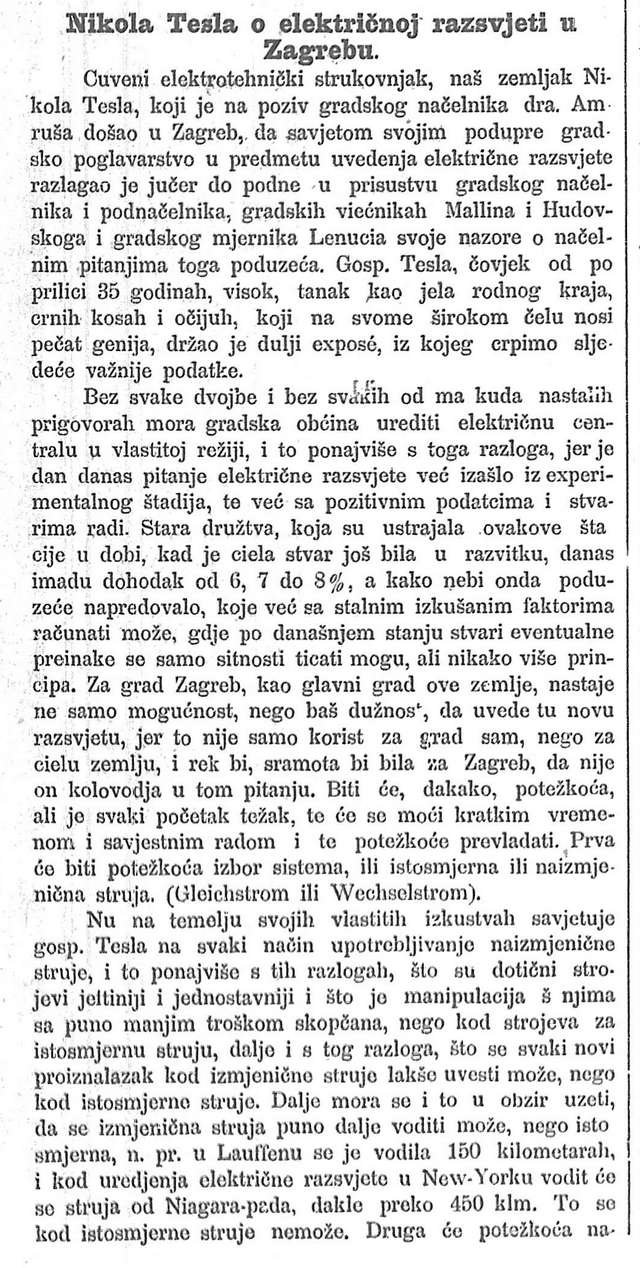

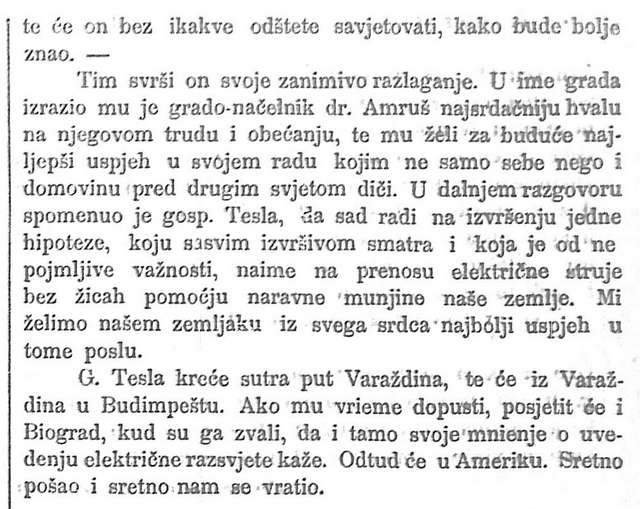
Many thanks to the National and Univeristy Library in Zagrebu for having published Narodne novine
from 25 May 1892, where this little known and important article has been published.
Memorial plaque from 1990 in
Ćirilometodska street in the Upper Town of Zagreb,
placed in honor of Nikola Tesla, on the building of the City Council
where in 1892. he said the following:
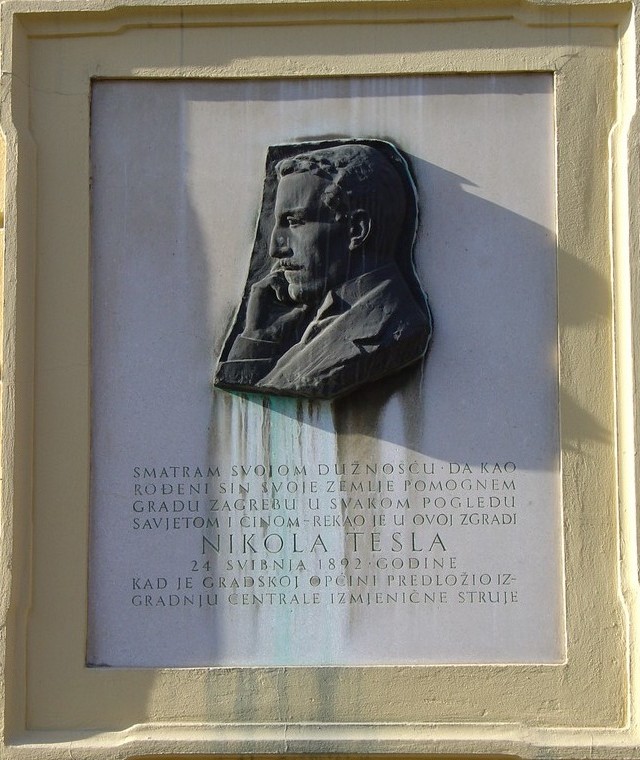
Nikola Tesla: Smatram svojom dužnošću da kao rođeni sin svoje zemlje
pomognem gradu Zagrebu u svakom pogledu savjetom i činom.
Nikola Tesla: I consider it my duty, as a native son of my country,
to assist the city of Zagreb by advice and help in every way I can.
Pronounced in the City Council of Zagreb on 24th May 1892.
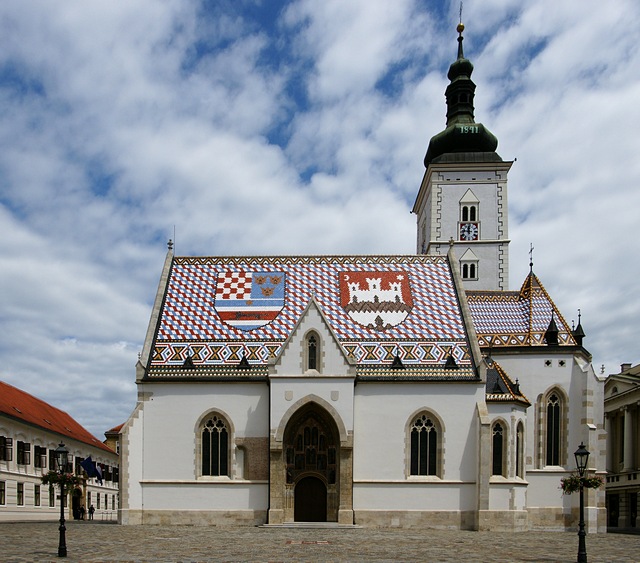
The above plaque in honor of Tesla's visit to the city of Zagreb is kept in Ćirilometodsa street,
quite near the Church of St Mark in the Upper Town of Zagreb.
placed in honor of Nikola Tesla, on the building of the City Council
where in 1892. he said the following:

Nikola Tesla: Smatram svojom dužnošću da kao rođeni sin svoje zemlje
pomognem gradu Zagrebu u svakom pogledu savjetom i činom.
Nikola Tesla: I consider it my duty, as a native son of my country,
to assist the city of Zagreb by advice and help in every way I can.
Pronounced in the City Council of Zagreb on 24th May 1892.

The above plaque in honor of Tesla's visit to the city of Zagreb is kept in Ćirilometodsa street,
quite near the Church of St Mark in the Upper Town of Zagreb.
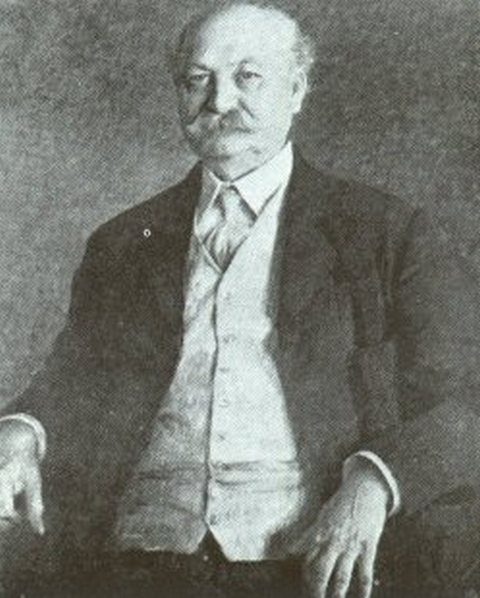
Milan Amruš (1848-1919), mayor of the city of Zagreb,
who received Nikola Tesla at the City Council on 24th May 1892.
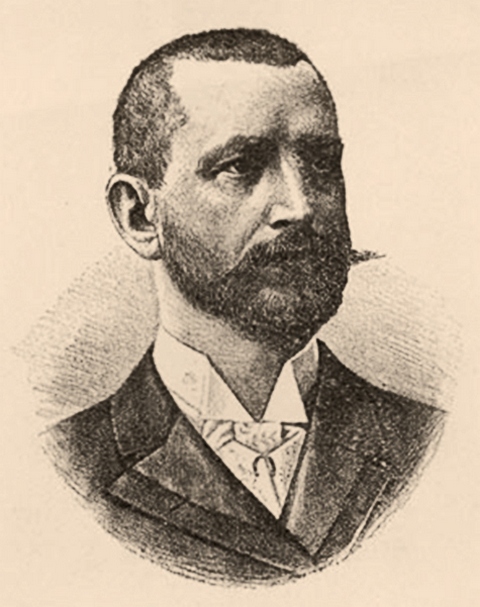
Present at Nikola Tesla's lecture was Milan Lenuci (1849.-1924.), the City Land
Surveyor and the author of the Lenuci horseshoe (green area) in Zagreb. He was born
in the city of Karlovac, where Tesla attended the high school 1870-1874.
A part of the Lenuci horseshoe is the Botanical Garden in Zagreb.
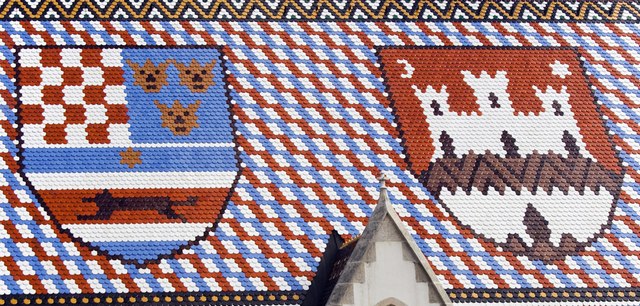
A detail from the roof of the church of St Mark in Zagreb, which is quite near the City Council.
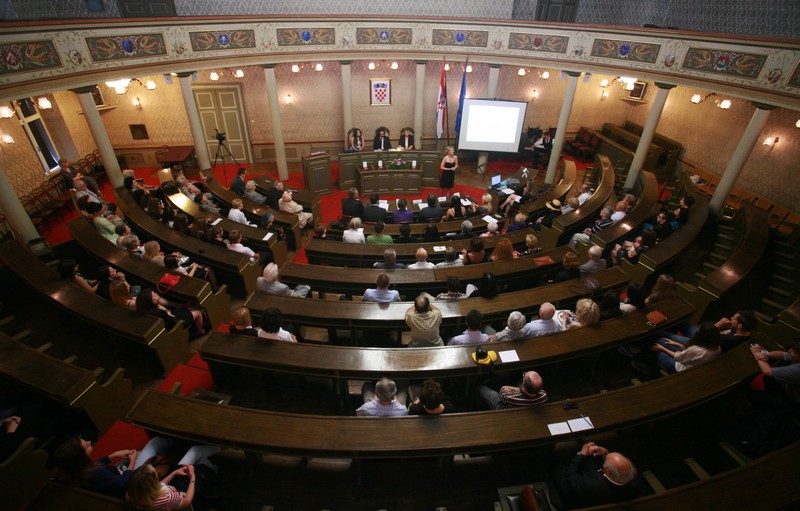
Nikola Tesla was hosted in the main hall of the Zagreb City Council.
On the photo, celebration of 130th anniversary of the Croatian Shorthand Society (Hrvatsko stenografsko društvo) in Zagreb, founded in 1882.
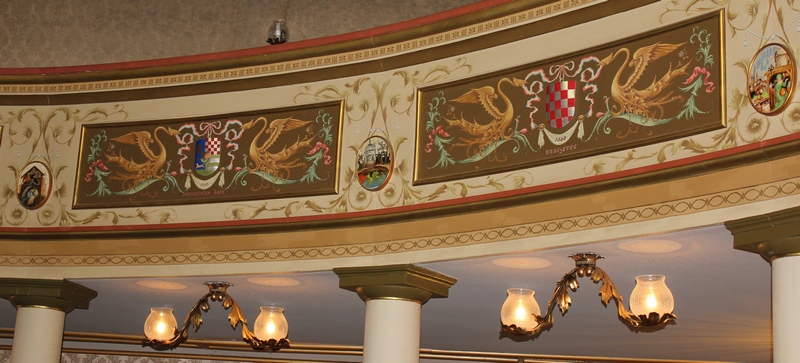
Beautiful Croatian Coats of Arms decorating the main hall of the Zagreb City Council, in which Nikola Tesla was hosted.
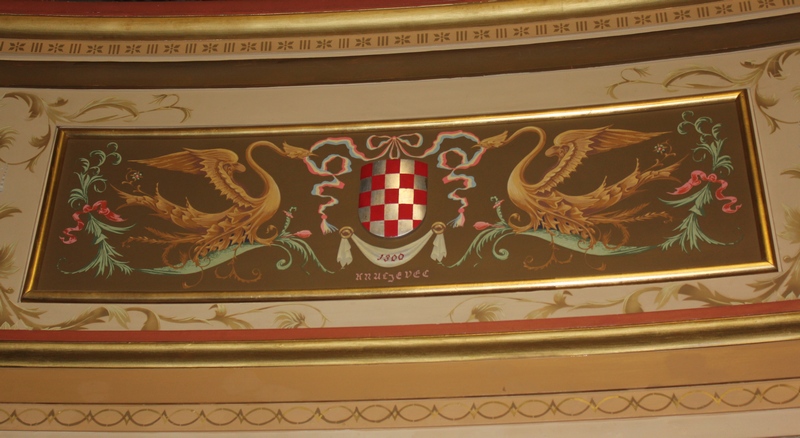
Croatian Coat of Arms is among the most beutiful in the world
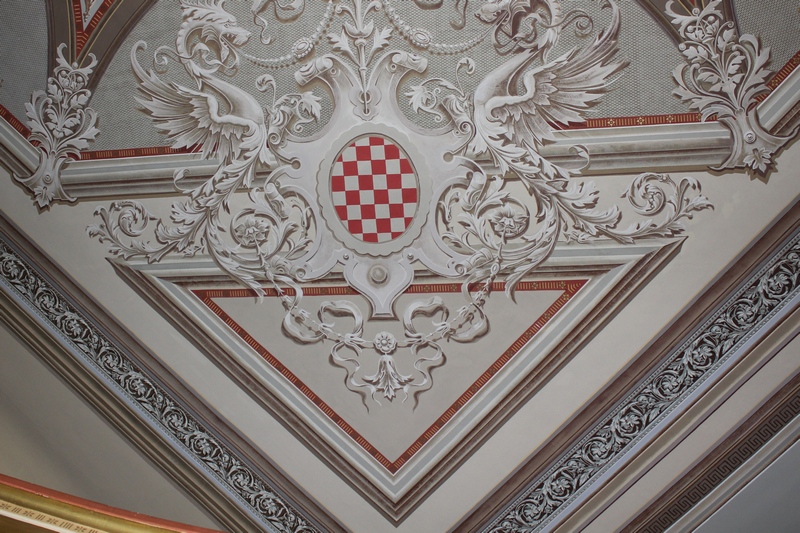
Croatian Coat of Arms on the ceiling of the Zagreb City Council
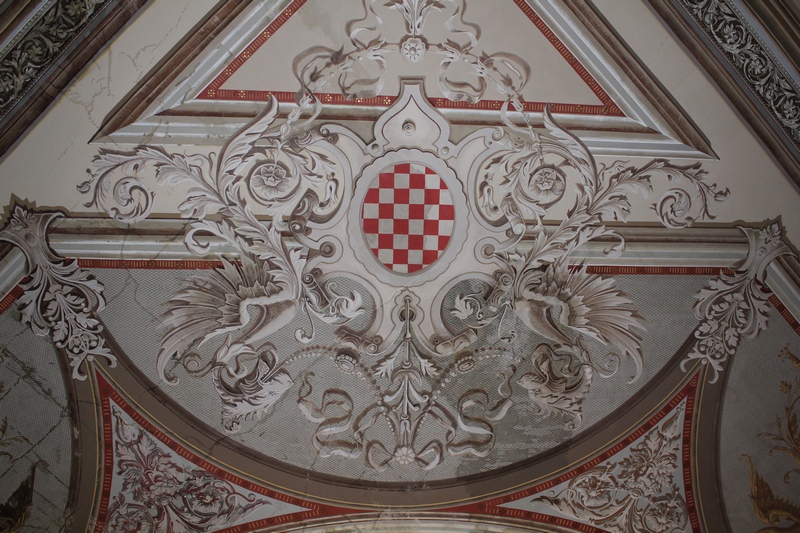
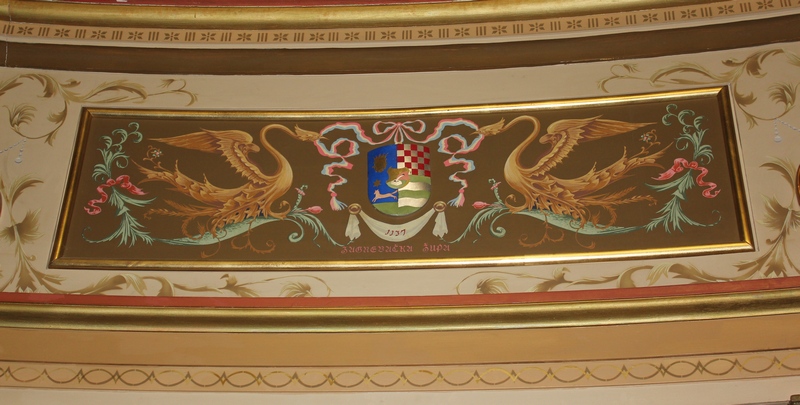
Nikola Tesla u Zagrebu 1892.
Nikola Tesla
Croatian Science
Croatia, its History, Culture and Science